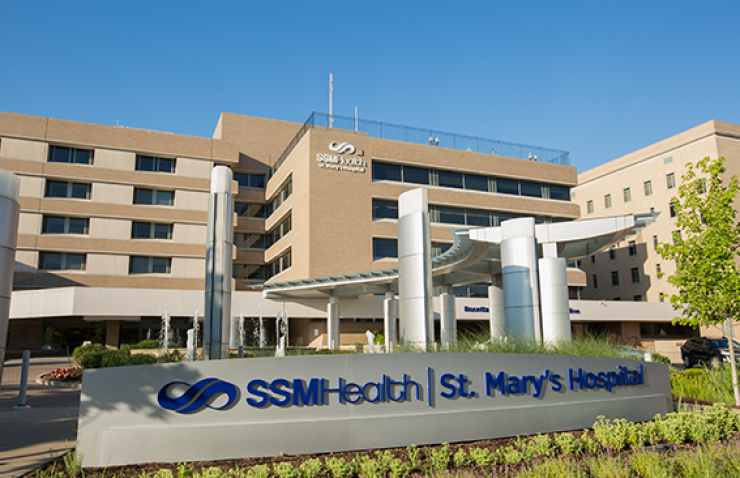CHICAGO — Looking to shed the risk of rising rates, St. Louis-based SSM Health is jumping into the market Tuesday with a $175 million taxable issue to refinance privately placed debt that otherwise would require action in mid-2019.
The deal comes with the system on more stable fiscal footing since its last sale in the spring, with two rating agencies shifting their outlooks to stable from negative.
Proceeds will repay the balance on a privately placed $81 million taxable term loan with Bank of America that matures next June and pay off the system’s $95 million of tax-exempt 2014J series that was directly placed with JPMorgan with an expiration of next June. As part of the financing, the system is also tapping its line of credit for $60 million to refinance another series of existing debt coming due.
“We are seeing rates creeping up, so we felt like this was an opportune time to lock in current interest rates and take interest rate risk off the table,” Mike Malewicz, the system’s vice president of treasury and chief investment officer, said in an interview along with other finance team members in New York City for the pricing.

The transaction will also lower the system’s floating-rate exposure by reducing the floating-rate component of its debt portfolio to 25% from 30%. Little impact is expected on overall interest expenses.
The deal “allows us to maintain a flexible capital structure in order to fund our continued growth,” Malewicz said in a recorded investor presentation.
The system will reopen either a 2017 or 2018 taxable CUSIP to issue the bonds as permitted by bond documents.
JPMorgan and Barclays are the underwriters. The underwriting team is marketing both options that have differing maturities and will decide based on investor interest and the pricing results. SSM Health will issue directly without a conduit.
The SSM team opted to reopen a CUSIP to cut the time needed to get to market that is associated with establishing new bond documents. There’s also the added benefit of cutting costs.
“For us, it was about the simplicity of getting to market more quickly” with all terms, language, and disclosure already in in place, Malewicz said in the interview.
The deal took about five weeks to pull together. The taxable issuance process was further streamlined as the system’s timely and detailed disclosure practices allowed it to avoid publishing a new appendix A. SSM used the appendix attached to its spring sale and updated it with information from its quarterly MD&A -- management discussion and analysis.
The finance team said its board, bond counsel, underwriter’s counsel, senior management and market participants were all on board with the appendix A move, and it believes its deal may be the first to take that step.
Ahead of the sale, Fitch Ratings shifted the system’s outlook to stable from negative and affirmed its AA-minus rating.
S&P Global Ratings affirmed its A-plus rating after moving the outlook to stable from negative in a report at the end of September.
Moody's Investors Service assigned its A1 rating to the SSM Health deal and a stable outlook.
The Catholic system generates more than $7 billion of revenues from its facilities that include 24 hospitals operating in six markets in four states: Missouri, Illinois, Oklahoma, and Wisconsin. It also operates a health plan — Dean Health — that serves more than 400,000 members in Wisconsin.
“We have grown substantially in the last seven years both through acquisitions and organic growth,” said chief financial officer Kris Zimmer in the presentation. The most recent acquisition came in early this year when SSM took over sponsorship of the Congregation of Sisters of St. Agnes, which operates Agnesian HealthCare and Monroe Clinic in Wisconsin.
The system’s largest capital commitment is the new $500 million St. Louis University hospital campus addition which is set to open in September 2020. The system took control of the hospital in 2015.
After several years of operating struggles during which its margins sunk to under 1%, the balance sheet is on the mend with profitability on the rise. The system also has $225 million of available room in a $400 million commercial paper program that it can tap quickly for liquidity.
The system’s rating "is driven by SSM's strong financial profile assessment, multi-state size and scale, including an owned Health Plan, combined with Fitch's expectation that SSM will continue to execute on their strategic plan, growing unrestricted liquidity and sustaining improved operational performance that will support ongoing capital spending,” Fitch said.
Moody’s said the upcoming sale addresses near-term refinancing requirements but increases SSM's refinancing needs over the next several years. Issuing under the Series 2018 bonds will require refinancing of $523 million in 2023 and tapping the 2017 series would require refinancing of $676 million in 2027.
The system’s core strengths like its large size and scale are offset by “notable challenges” including historically weaker operating performance in several markets, the university hospital project, a history of inconsistent performance that is weaker than that of peer organizations, and a material unfunded pension liability, Moody’s said.
The system’s fiscal results are on track through the third quarter of fiscal 2018 based on expectations in S&P’s late September report. Various initiatives are projected to achieve around $150 million in “total expected operational efficiencies” in fiscal 2018.
A failure to reach targeted operating expectations for the fiscal year or a balance sheet weakening could drive a downgrade while a multiyear trend of sustainable fiscal improvements could drive a shift to a positive outlook, S&P said.





